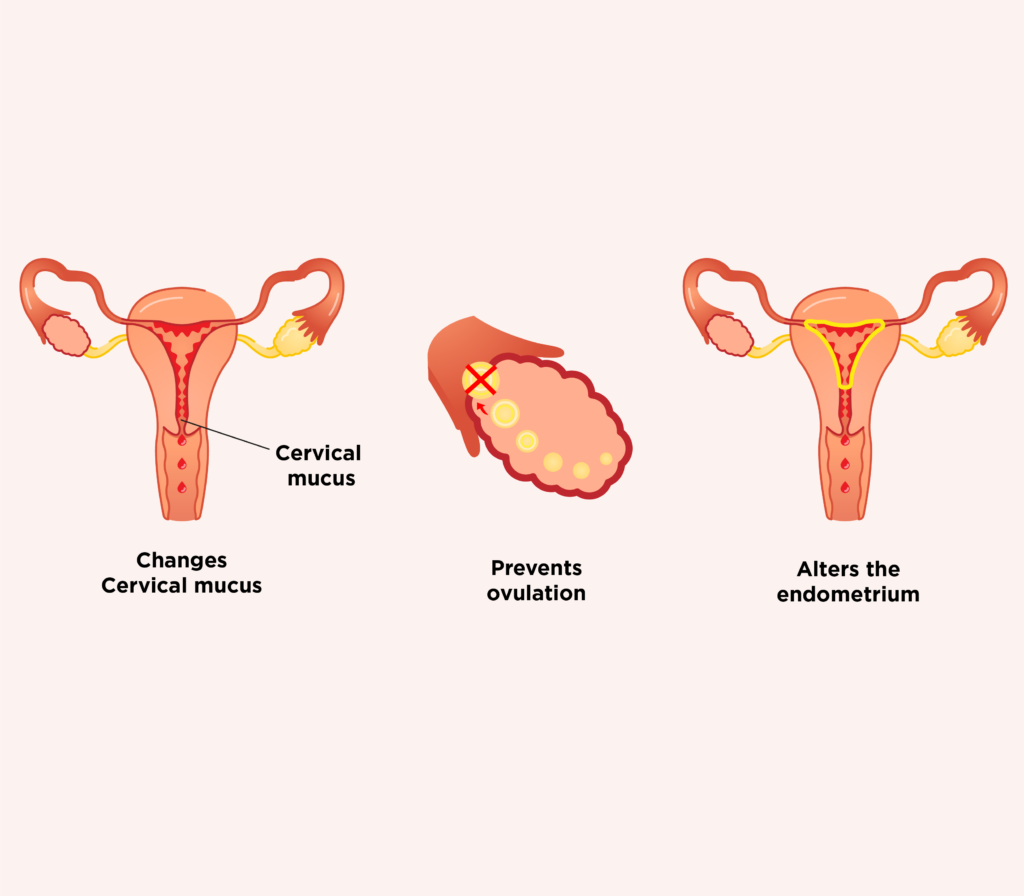How Do Oral Contraceptives Work?
Oral contraceptives play a very important role in the various strategies used to prevent a pregnancy. When taking these pills, the synthetic hormones in them work in harmony with a woman’s natural menstrual cycle, thereby influencing various key aspects of reproduction.
A Snapshot of the Different Kinds of Oral Contraceptives Available on the Market:
1. Combination Pills1 2 : These pills consist of two hormones: estrogen and progestin, which act together against unplanned pregnancies. These hormones achieve this by inhibiting the release of eggs from the ovaries (prevents ovulation), thickening cervical mucus (thereby creating a barrier for sperm penetration) and thinning the uterine lining (to prevent implantation of a fertilized egg). Taking these pills, thus creates an unsuitable environment for pregnancy to take place (see Figure 1 below).

Figure 1: How oral contraceptive work to prevent pregnancies
(a) Cervical mucus is thickened to make the entry of sperm difficult; (b) Ovulation is prevented, thereby resulting in that no egg cell is released to fuse with a sperm cell; (c) The endometrium is thinned to prevent the occlusion of a fertilized egg.
There are generally three types of combination oral contraceptives (namely those containing both estrogen and progestin) and a progestin only pill (containing only progestin) available.
Combination oral contraceptives are grouped into four main classes according to their estrogen and progestin hormone content 3 4:
- Monophasic pills: Contain one pill to be taken daily, that contains the same amount of estrogen and progestin throughout the pack.
- Biphasic pills: Contain one pill to be taken daily that contains two combinations of estrogen and progestin concentrations, thereby splitting the month into two phases.
- Triphasic pills: Contain one pill to be taken daily that contains three combinations of estrogen and progestin concentrations, thereby splitting the month into three phases.
- Quadraphasic pills: Contain one pill to be taken daily that contains four combinations of estrogen and progestin concentrations, thereby splitting the month into four phases
2. Progestin-Only Pills 3:
These pills only contain progestin. Progestin thickens the cervical mucus and also thins the uterine lining, making it less hospitable for a fertilized egg. These pills are a good option for women who prefer to take a contraceptive containing only one active ingredient.
The Benefits of Oral Contraceptives 3 4:
Aside from their contraceptive purpose, oral contraceptives also offer a range of additional benefits.
- Regulation of menstrual cycles: These pills assist in regulating irregular periods and reduce menstrual cramps.
- Acne control: Certain oral contraceptives can aid in the management of acne.
- Hormonal balance: Some oral contraceptives can help balance hormone levels, leading to, for example, improved mood and reduced symptoms of premenstrual syndrome (PMS), and also to reduced androgen production caused by polycystic ovary syndrome (PCOS).
- Oral contraceptives may also lower the risks of cancer of the ovaries and lining of the uterus; preventing an ectopic pregnancy; ovarian cysts; and noncancerous breast disease.
Choosing The Right Pill for You:
When making a choice of an oral contraceptive pill that is most suitable for you, it is important to consider factors, which are not limited to, your overall health, personal preferences, and any underlying medical condition(s). It is always important to remember when consulting a healthcare professional that you to discuss your need(s) for oral contraceptives and to find the correct pill combination that meets your reproductive needs and choice(s).
Speak to your healthcare practitioner about Actor Pharma’s solutions in Oral Contraception.
The Responsibility Factor2 4
It is very noteworthy to remember that while taking oral contraceptives, they are only protecting you from an unwanted pregnancy when they are taken as directed and dispensed by your healthcare professional. For example, remembering to take your pills at the same time of day (e.g., set an alarm on your cellphone to remind you to take your pills or place your pills at a place that you can’t miss them, such as next to your bed), and what to do when you forget to take a pill.
Oral contraceptives have revolutionized the landscape of reproductive health, providing women with unparalleled control and choice. Knowledge is power and is vital in making informed decisions for you and your reproductive health. My Life My Choice.
Disclaimer: This blog is for informational purposes only and should not substitute professional medical advice. Consult a healthcare professional for personalized guidance regarding contraception options.
References:
1. American College of Obstetricians and Gynecologists. (2021). Combined Hormonal Birth Control: Pill, Patch, and Ring. https://www.acog.org/womens-health/faqs/combined-hormonal-birth-control-pill-patch-ring
2. Planned Parenthood. (n.d.). Birth Control Pills.
https://www.plannedparenthood.org/learn/birth-control/birth-control-pill
3. ADYN Types of Birth Control Pills: Monophasic vs. Biphasic vs. Triphasic
https://adyn.com/blog/types-of-birth-control-pills/
4. Mayo Clinic: Combination birth control pills https://www.mayoclinic.org/tests-
procedures/combination-birth-control-pills/about/pac-20385282
Editor: Dr Liesl Brown Ph.D

Understanding Oral Contraception
Endometriosis Facts
Emergency Contraceptives
Empowered Menopause